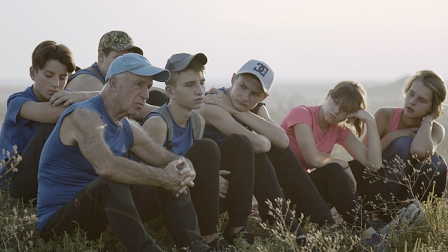


Alisa Kovalenko: We will not Fade Away

Andriy, Liza, Lera, Ruslan, Illia. Ukrainian protagonists in this heartwarming and also touching documentary from the village Stanytsia Luhanska near the frontline, which after February last year is occupied by Russia. They are teenagers, they have hope, they have dreams, they are creative. They take photos, make music, repair and build motorbikes, plan to be an actor, they have fun as teenagers have and should have…They look for ways of having a good life in spite of the sounds and dangers of the war close to their homes. They live with their families, mums and dads and grannies. They are full of energy, they want to get away from the village, they call it “an asshole”. The film offers them to have a short break from being there, when they are invited by a famous sports commentator to get a tour to Himalayas. They go. A once-in-a-life experience.
Alisa Kovalenko is the director, she has – together with Serhiy Stetsenko – filmed the teenagers, and their families from 2019 till 2022 with an extraordinary attention to and sensibility for what it means to be on the edge of adulthood, as one family member expresses it. As she showed in a previous film “Home Games”, Kovalenko knows how to find the beautiful moments in the daily lives of the boys and girls and make those into a Cinema language she masters. Without breaking any ethical borders.
Andriy, the boy who has his garage for the motorbike, arranges in this place a New Year celebration with an electric light show, pours champagne in two glasses, hands one of them to his granny: “Thank You for Being There for Me”. Another granny talks seriously to Illia, who wants to be an actor: You must leave from here if you want to be an actor, if you stay you can be a policeman. In a previous scene you have seen Illia paint his face white making him look like the sad clown in “Les enfants du Paradis”. And you see Lera (or is it Liza, I mix them up sometimes, sorry) listening to her mother telling her that women are there to be married and serve their husbands. And Ruslan is at his computer rapping a great poem. Earlier you have seen him down in the mine doing the dirty job his father does.
The last 20 minutes of the film describes the trip to the Himalayas – after the film has shown – with a lot of humour – the joyful training moments they perform at home to be ready for the trip that leads them so say that they want to stay here. So this is what beauty looks like! Energy all over, as there is in the whole film that is beautifully edited by Maryna Maykovska and Kasia Boniecka. They have found a flow and yet there are observational poetic moments without any “action”, many times with music that fits the situations and you are happy, when the film does not go down in black upon their return to their homes. A superb montage with the teenagers closes the film and highlights that the intention of the film is to give an homage to LIFE and YOUTH. You leave this masterpiece full of (unbearable?) hope. Slava Ukraini!
Ukraine/Poland/USA/Norway, 2023, 98 mins.
Still (FIFDH Geneva)